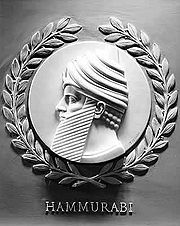Hammurabi stone relief in the chamber of US House of Representatives
(Texts: All Artifacts, Color Coding, & Writings in Bold Type With Italics Inside Parenthesis, are Added by Editor R. Brown, not the Authors, Translators, or Publishers!)
(gods in blue …mixed-breed demigods in teal…)
Circa 1800 B.C., Hammurabi, the king renowned for his law code, ascended the throne in Babylon and began to extend its boundaries. According to his inscriptions the gods not only told him if and when to launch his military campaigns but were literally leading his armies:
“Through the power of the great gods the king, beloved of the god Marduk,
reestablished the foundations of Sumer and Akkad.
Upon the command of Anu, and with Enlil advancing in front of his army,
with the mighty powers which the great gods gave him,
he was no match for the army of Emutbal and its king Rim-Sin …”
To defeat more enemies the god Marduk granted Hammurabi a “powerful weapon” called “Great Power of Marduk”:
“With the Powerful Weapon with which Marduk proclaimed his triumphs,
the hero (Hammurabi) overthrew in battle the armies of Eshnuna, Sabartu and Gutium…
With the “Great Power of Marduk” (alien technologies)
he overthrew the armies of Sutium, Turukku, Kamu…
With the Mighty Power which Anu and Enlil had given him
he defeated all his enemies as far as the country of Subartu …”
Hannurabi treated Larsa…as an adversary, boasting that he “overthrew Larsa in battle” and attacked its sacred precinct “with the mighty weapon which the gods had given him.”
Hammurabi was now demanding their (the goddesses) return to Babylon, from where Khedorla’omar had taken them captive (Larsa).
Khedorla Texts (partial)
“To Sin-Idinna speaks thus Hammurabi regarding
the goddesses who in Emutbal have been behind doors
from the days of Kudor-Laghamar, in sackcloth attiree:
When they ask them back from thee, to my men hand them over;
The men shall grasp the hands of the goddesses;
To their abode they shall bring them …”
Sin-Iddinam ruled the ancient Near East city-state of Larsa from 1785 BC to 1778 BC. He was the son of Nur-Adad, with whom there may have been a short co-regency overlap.
Hammurabi repeated the demand for the return of the goddessess to Babylon in yet another stiff message to Sin-Idinna, this time, sending it by the hand of high military officers. (text in Brittish Museum)
“Unto Sin-Idinna thus sayeth Hammurabi:
I am now dispatching Zikir-ilshu, the Transport Officer,
and Hammurabi-bani, the Frontline Officer,
that they may bring the goddesses who are in Emutbal.
Thou shalt cause the goddesses to journey
in a processional boat as in a shrine, that they may come to Babylon.
The temple-women (mixed-breed attendees to the gods) shall accompany them.
For food of the goddesses they shalt load pure cream and cereals unto the boat,
and chosen soldiers to bring the goddesses to Babylon in safety.
Delay them not; let them speedily reach Babylon …”
was seeking restitution for events that had happened long before his time, in the days of Kudur-Laghamar, the Elamite regent of Larsa.
Anu and Enlil finally accepted Marduk’s claim to supremacy at Babylon. Commemorating the fateful decision in the preamble to his law code, the Babylonian king Hammurabi put it in these words:
“Lofty Anu (Anunnaki King), lord of themselves gods who from Heaven came to Earth,
and Enlil, lord of Heaven and Earth who determines the destinies of the land,
Determined for Marduk, the firstborn of Enki, the Enlil-functions over all mankind;
Made him great among the gods who watch and see,
Called Babylon by name to be exalted,
Made it supreme in the world;
And established for Marduk, in its midst, an everlasting kingship…”
Babylon, then Assyria rose to greatness. Sumer was no more…
